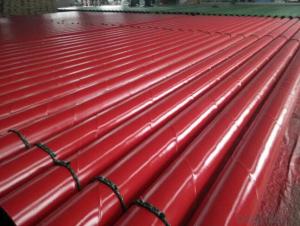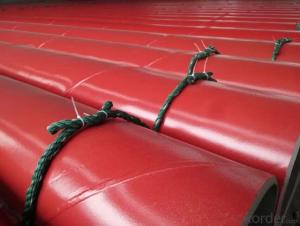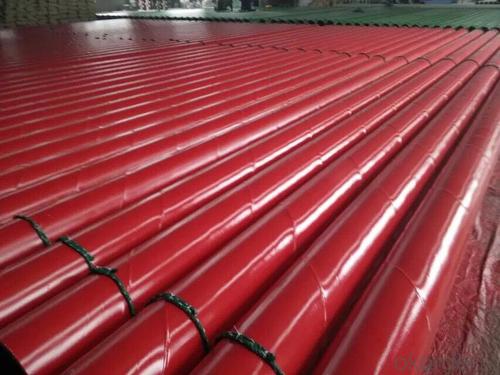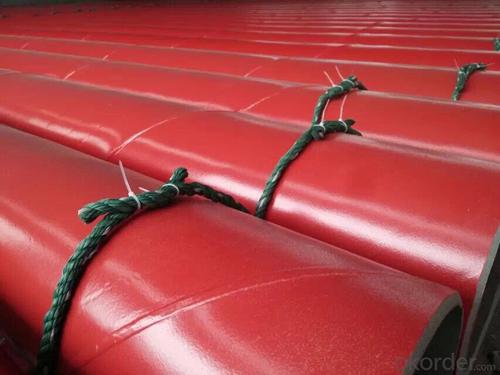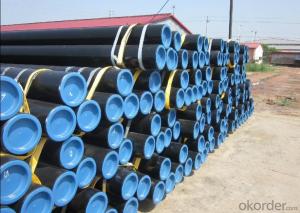seamless and welded 3PE steel pipe external coating
- Loading Port:
- China Main Port
- Payment Terms:
- TT OR LC
- Min Order Qty:
- -
- Supply Capability:
- -
OKorder Service Pledge
OKorder Financial Service
You Might Also Like
Specifications
water pipeline inner-layer tape
1 Butyl rubber as adhesive
2. SGS test report and DVGW certificate
3. corrosion protection
water pipeline inner-layer tape
State-of-the-Art Pipeline Protection for All Climates & Environments
System description:
WATER PIPELINE Inner -layer tape also be called pipe wrap anti-corrosion tape, polyethylene wrap tape.
water pipeline Inner-layer tapeT100 is engineered to assure a high bond to the primed pipe surface with excellent conformability characteristics, aggressive adhesive for corrosion protection and repair of main line coatings.
Inner-layer tapeT100 series is cold applied tape coating system for corrosion protection of Oil, Gas, Petrochemical, and Waste Waterburied pipeline, pipe can be buried, also can be underground ,overhead ,onshore and offshore .
Structure of water pipeline inner wrap tape
The specification of the tape consists of two layers, adhesive layer and film backing
Adhesive: butyl rubber
Film backing: Special blend of stabilized polyethylene
Features & Benefits
Provides a permanent bond to the primed steel pipes surface and provides protection against chemical electrolytic corrosion for underground pipelines.
long term corrosion protection
Worldwide reference lists. Established in-ground history
High chemical resistance under service temperature.
Outstanding electric property and permanent adhesion.
Cold applied, No release liner. Makes installation fast and easy.
Complies with EN-DIN 30672 and AWWAC-214 international standards and also ASTM standards.
Be used for water pipeline corrosion protection
System Properties
Type | T138 | T 150 | T165 | T180 | T 250 | T265 | T280 | |
Thickness | 15mil 0.38mm | 20mil 0.508mm | 25mil 0.635mm | 30mil 0.762mm | 20mil 0.508mm | 25mil 0.635mm | 30mil 0.762mm | |
Backing | 9mil 0.229mm | 9mil 0.241mm | 10mil 0.25mm | 10mil 0.25mm | 15mil 0.38mm | 20mil 0.508mm | 25mil 0635mm | |
Adhesive | 6mil 0.152mm | 11mil 0.279mm | 15mil 0.381mm | 20mil 0.508mm | 5mil 0.127mm | 5mil 0.127mm | 5mil 0.127mm | |
When used for ductile iron pipes inner layer 980-20 or 980-25 and outer layer 955-20 or 955-25 are recommended. | ||||||||
Elongation | ³300% | ³400% | ||||||
Tensile Strength | 55 N/cm | 70 N/cm | ||||||
Color | Black | White | ||||||
Peel Adhesion to Primed Pipe | 33 N/cm | |||||||
Dielectric Strength | 30 KV | |||||||
Dielectric Breakdown | 26 KV/mm | |||||||
Cathodic Disbandment | 0.24 in radius 6.4 mm | |||||||
Water Vapor Transmission Rate | < 0.1% | |||||||
Volume Resistivity | 2.5 x 1015 ohm.cm | |||||||
Impact resistance | 5.5Nm | |||||||
Penetration Resistance | <15% | |||||||
Performance | AWWA C-209,ASTM D 1000,EN 12068 | |||||||
Order information
Length | 100ft(30 M),200ft(60 M),400ft(120 M),800ft(240 M) |
Width | 2’’(50mm),4’’(100mm),6’’(150mm),17’(450mm),32’’(800mm) |
- Q: What is the difference between nominal and actual pipe size?
- Nominal pipe size refers to the designation used to identify the approximate inside diameter of a pipe, while actual pipe size refers to the measured inside diameter of a pipe. The nominal size is a standardized value, whereas the actual size may vary slightly due to manufacturing tolerances.
- Q: Can steel pipes be threaded?
- Yes, steel pipes can be threaded. Threading is a common process used to create a screw-like pattern on the outer surface of the pipe, allowing it to be connected to other fittings or components. Threading can be done manually or with the help of machinery, depending on the size and requirements of the pipe.
- Q: How are steel pipes used in the agricultural irrigation systems?
- Due to their strength and durability, steel pipes are widely used in agricultural irrigation systems. These pipes effectively transport water from a well or reservoir to the fields where crops are cultivated. One major advantage of using steel pipes in such systems is their ability to withstand high pressure and heavy loads, making them suitable for the transportation of large volumes of water over long distances without the risk of bursting or breaking. Additionally, steel pipes exhibit a high resistance to corrosion, which is crucial in agricultural settings where they may come into contact with fertilizers or other chemicals. Aside from their durability, steel pipes offer a smooth interior surface that minimizes friction and ensures a consistent water flow. This is essential in irrigation systems as it guarantees even water distribution across the fields, promoting optimal crop growth. Moreover, steel pipes can be easily connected and configured to meet the specific layout and requirements of the irrigation system. In summary, steel pipes play a crucial role in agricultural irrigation systems by facilitating the efficient and reliable transportation of water to crops. Their strength, durability, resistance to corrosion, and smooth interior surface make them an ideal choice for these applications.
- Q: How are steel pipes used in building foundations?
- Steel pipes are often used in building foundations to provide structural support and stability. They can be driven into the ground to act as piles, which help transfer the weight of the building to the underlying soil or bedrock. Steel pipes can also be used for deep foundation systems such as drilled shafts or caissons, which are used in areas with weak or unstable soil conditions. Additionally, steel pipes can be utilized for underground drainage and utility systems within the foundation structure.
- Q: What is the difference between carbon steel and cast iron pipes?
- The main difference between carbon steel and cast iron pipes lies in their composition and manufacturing processes. Carbon steel pipes are made from an alloy of iron and carbon, with additional elements such as manganese and silicon added for specific properties. They are typically stronger and more durable, making them suitable for high-pressure and heavy-duty applications. On the other hand, cast iron pipes are made by melting iron and pouring it into molds, resulting in a more brittle and less flexible material. Cast iron pipes are commonly used for drainage and sewage systems due to their corrosion resistance and sound insulation properties.
- Q: Are steel pipes suitable for nuclear power plants?
- Steel pipes are an ideal choice for nuclear power plants. This is because steel is a commonly used material in the construction of these plants, thanks to its exceptional mechanical properties, high strength, and durability. Various applications in nuclear power plants rely on steel pipes, including the transportation of cooling water, hot gases, and steam. The steel used in nuclear power plants undergoes careful selection and testing to meet strict safety regulations and quality standards. This is crucial because these pipes must have outstanding resistance to corrosion and high-temperature environments. They are exposed to harsh conditions such as high pressure, high temperatures, and radioactive materials. Moreover, steel pipes have a long lifespan and require minimal maintenance. This makes them a cost-effective option for nuclear power plants. They can endure extreme conditions, ensuring the plant's safe and reliable operation. Additionally, steel pipes can be easily fabricated, installed, and repaired, which is vital for the efficient functioning of a nuclear power plant. In summary, steel pipes are highly suitable for nuclear power plants due to their strength, durability, resistance to corrosion, and ability to withstand extreme conditions.
- Q: What does "DN25 PN16" mean?
- PN said the pressure is, PN16 is the pipe can withstand 16MPa general meaning, namely, an 16 kg.
- Q: Can steel pipes be used for underground steam pipelines?
- Indeed, underground steam pipelines can indeed utilize steel pipes. Given their robust and enduring characteristics, steel pipes are frequently employed for an assortment of pipelines, such as those carrying steam. Their capacity to endure elevated temperatures and pressures renders them suitable for the subterranean transportation of steam. Furthermore, steel pipes exhibit outstanding resistance to corrosion, a crucial feature for subterranean pipelines that encounter moisture and potentially corrosive substances in the soil. In summary, steel pipes represent a dependable and widely embraced option for underground steam pipelines.
- Q: Can steel pipes handle extreme weather conditions?
- Yes, steel pipes are known for their durability and ability to withstand extreme weather conditions. They are resistant to corrosion, rust, and can handle high temperatures, making them suitable for various climate conditions.
- Q: What's the difference between No. 20 steel pipe and 27SiMn Steel Pipe?
- 27SiMn =27 - steel pipe, which is a seamless steel tube material, the carbon content in 0.24 - 0.32%, SIMN single because it five elements (carbon manganese silicon Si, C, Mn, P P, S, guimeng sulfur) the high content of about 1.10 - 1.40%.
Send your message to us
seamless and welded 3PE steel pipe external coating
- Loading Port:
- China Main Port
- Payment Terms:
- TT OR LC
- Min Order Qty:
- -
- Supply Capability:
- -
OKorder Service Pledge
OKorder Financial Service
Similar products
Hot products
Hot Searches
Related keywords
